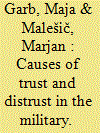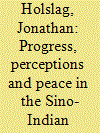| Srl | Item |
| 1 |
ID:
144745


|
|
|
|
|
| Summary/Abstract |
Trust in institutions is an important issue of political science and sociology. This article contributes to the discussion by exploring public trust in the military at the global, regional and national levels, and the causes of trust and distrust in the military. Analyses of public opinion data reveal that the military is a highly trusted social institution across the world. In Slovenia, the trust in the military is high as well; however, it is lower than international data would suggest, averaging at 50%. Against this background, the article focuses on the causes of trust. The original empirical survey was accomplished and shows that the most significant causes of a high level of trust in the military are its frequent and successful involvement in disaster relief, its professional qualifications and high performance, as well as its national defense role. Whereas the key causes of distrust are: the poor levels of transparency in its procurement process; the politicization of the military and organizational problems.
|
|
|
|
|
|
|
|
|
|
|
|
|
|
|
|
| 2 |
ID:
151154


|
|
|
|
|
| Summary/Abstract |
Recognition is vital for conflict resolution. This study was designed to learn more about the factors underlying the willingness to recognize the pain and suffering of the opponent in the asymmetrical protracted conflict between Israelis and Palestinians. Data were collected through a public opinion survey conducted with a representative sample of Israeli-Jewish adults (N = 511). Perceptions of threat/distrust toward Palestinians and dehumanization of Palestinians each made a significant contribution to explaining Jewish-Israeli (un)willingness to recognize Palestinian pain and suffering (R2 = .36). Hawkishness made an added significant contribution to the overall explanatory power of the model (R2 = .38). Higher scores on the threat/distrust scale and the dehumanization scale, as well as higher hawkishness predicted decreased willingness to recognize Palestinian pain and suffering. The implications of our findings for understanding the role of recognition and of moral concern in conflict resolution are discussed.
|
|
|
|
|
|
|
|
|
|
|
|
|
|
|
|
| 3 |
ID:
087755


|
|
|
|
|
| Publication |
2009.
|
| Summary/Abstract |
The Chinese and Indian government are eager to intensify bilateral ties. This paper evaluates whether this enthusiasm has positively affected perceptions of the two societies in general, political actors and experts. A review of opinion polls, publications and official documents learned that this is not the case. Mutual perceptions are marked with ambivalence and distrust.
|
|
|
|
|
|
|
|
|
|
|
|
|
|
|
|